Ronak Chhabra
After introducing starvation-level wages and removing protections available to the workers, the next target of the labour law codification is the trade unions and the industrial action. To tame the former and dismantle almost every possibility of the latter seems to be the objective of the reforms. This is how Prime Minister Narendra Modi is ensuring the ‘new India’ to further jump the ranks of ‘ease of doing business’.
On Thursday, the Industrial Relations Code Bill, 2019 – the third one out of the four labour codes – was presented in the Lok Sabha by the Labour and Employment Minister Santosh Kumar Gangwar. The Bill proposes changes to the provisions relating to the membership and registration of the trade unions—the representatives of the workers—giving too much flexibility to the employers to toy with.
The government strikes the first blow by further fettering the registration process of a trade union. The IR code provides a minimum number of workers—at least 10% of the total strength or 100 workers, whichever is lesser—in an establishment to be the members of the union which seeks registration. The existing Trade Unions Act of 1926—which the code subsumes—requires only seven members of the union for the same.
Further, for a trade union to be recognised as a ‘negotiating body’ by the employer in times of labour dispute, the workers’ front requires a formal support of 75%, or more workers on the muster roll of the industrial establishment. In case of no union securing the stipulated support, a council is to be formed consisting of different representatives.
The introduction of such a requirement must be read as giving too much room to the employers to wriggle with, as their refusal to recognise a union becomes the triggering point of many of the industrial dispute. Recent example being the labour distress in Kerala caused by Muthoot’s management or the struggle of Motherson workers in Tamil Nadu.
Considering the “repressive” nature of the proposed provisions, both were opposed by the workers’ bodies in 2015 when the code was first put on table for a discussion. This time, however, even the ‘formality’ of a consultation with the trade union representatives was done away and inclusion of both the provisions in the 2019 draft—despite strong criticism—further verifies the “killing of tripartism” under the Modi rule.
In India, getting a trade union registered was never easy. Workers get threatened by the management to withdraw their support to the union and in some cases even get transferred. Therefore, workers’ bodies had demanded that union registration be made a time-bound process. This finds no mention in the proposed code.
Moreover, the code restricts outsiders to an establishment from holding an office bearer position in the trade union.
The other overriding concern is that the clauses surrounding industrial actions and conciliations will translate to an apparent ban on workers raising any demands.
This has been achieved, at first, by restricting the workers to go on a strike during the conciliation process, which usually follows the strike notice. What’s more, provision to submit the strike notice 14 days prior has been extended to all industrial establishments, which was earlier only applicable to ‘public utility services’ under The Industrial Disputes Act, 1947.
Another problem is the changing of the definition of the strike which now includes ‘casual leaves’ of the employees. Earlier, workers used to put pressure on the management by using their leaves to register their absence; however, now that provision has been taken away. As per the proposed code, strike also includes ‘concerted casual leave’ by 50% or more workers in an establishment. Going by this definition, a strike notice will be required prior to the ‘mass leaves’ of workers and if not, an action can be taken against them.
If these were not enough, the IR code also cements contractualisation of the labour by introducing ‘fixed term employment’ and provides executive powers to the state governments to ease the retrenchment norms.
What this means is that, if the code is passed, another nail will have been hammered by the Modi Government into the coffin of the labour laws in the country.
(Ronak Chhabra is a Bengaluru based reporter.)




